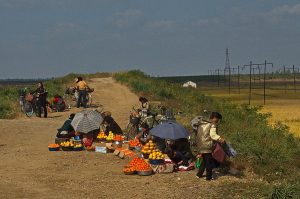North Korean citizens continue to suffer the negative economic consequences of their government’s COVID-19-related policies. Despite increased border security to prevent the spread of the virus, defections across the border have continued and have resulted in even stronger counter-measures by the government. Moreover, the situation for ordinary people has only worsened recently, with the ruling Worker’s Party pushing for increased control over market activity.
The North Korean economy has been hit harder than usual this year due to the prolonged border closure with China. Since January, many North Korean citizens – especially those living in border areas – have had to dramatically cut spending and find alternative ways to earn a living. Given the border closure, imported daily necessities such as cooking oil have not been able to reach markets in North Korea and thus made life for locals all the more difficult.
Although more products have been able to cross into the country in recent months, North Korean markets are once again being constricted – this time by the North Korean government itself.
According to a recent report by Daily NK, the North Korean government recently crafted new market management regulations to give the Workers’ Party greater involvement in and control over markets throughout the country. The new order calls for the establishment of a system in which provincial, municipal, and county people’s committees manage the creation and dissolution of markets, according to a local source in North Hamgyong province, with the commercial departments of these committees ultimately reporting to the Cabinet and the Central Committee of the Worker’s Party.
If this is indeed the case, this could result in more restrictions on market activity and could make it harder for locals to operate their businesses. In the past, the markets were managed and controlled by the commercial departments of provincial people’s committees, not by the Central Committee.
The order also instructed that fees on imported goods be increased and directed the people’s committees to regulate products in the markets while expanding the list of goods available and – in consultation with party committees – setting maximum and minimum prices.
“[The new orders] call for overlapping control of the markets and aim to raise market fees and other financial burdens, so they [ultimately] put ordinary people at a disadvantage,” the source said.
This reported change in the system has yet to be shared with the general public and it remains unclear when the government will implement these changes. If implemented, however, locals will likely face increased restrictions concerning what they can buy and sell and at what price.
This is bad news for ordinary North Koreans, many of whom are already surviving on the bare minimum. Given the lack of market activity this year, many locals have had to resort to the much riskier work of smuggling in goods from China. Some border residents are in such desperate situations they say they will “die before winter” from starvation as a result of the ongoing border blockade.
This dire situation has meant that, despite the strict border controls put in place to prevent the spread of the virus, people are still trying to defect to China. As a result, North Korea’s Ministry of State Security (MSS) has been ordered to capture “fugitives” and the “brokers who help them,” and to strengthen control over residents “who continue to choose to defect,” even if this meant “secretly tracking their hidden movements.”
What is noteworthy about this order, however, is that it was sent out to all MSS officials – not only ones in North Korea, but also to agents operating overseas at the North Korean embassies in China, Russia, and several other nations. According to the order, North Korean authorities have instructed officials to “quietly” bring back defectors in China who are caught trying to go to South Korea, or brokers who criticize the North Korean regime.
With winter quickly approaching, the plight of North Koreans is likely to get worse over the coming months. Border controls remain extremely tight and smuggling in supplies from China is becoming an increasingly dangerous practice. Plus, even if some are able to escape to China, there’s no telling whether their defection will be successful or whether they will be caught and end up either dead or in a labor camp.
“What is scarier than the virus right now is starvation and the cold weather,” one resident said. It’s not the virus that is killing North Koreans. Instead, it is the policies of their own government.
Gabriela Bernal is currently a Ph.D. candidate at the University of North Korean Studies in Seoul, South Korea. She is also a translator at Daily NK and her writings have appeared in various online media outlets. You can find her on Twitter @gabrielabbernal
































